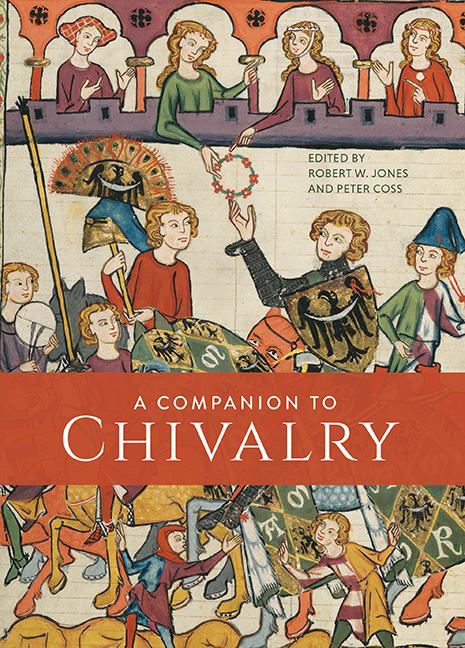Book contents
- Frontmatter
- Contents
- List of Illustrations
- List of Contributors
- Introduction
- 1 The Origins and Diffusion of Chivalry
- 2 The Organisation of Chivalric Society
- 3 The Secular Orders: Chivalry in the Service of the State
- 4 The Military Orders
- 5 Marshalling the Chivalric Elite for War
- 6 Chivalric Violence
- 7 Chivalry in the Tournament and Pas d'Armes
- 8 Heraldry and Heralds
- 9 Arms and Armour
- 10 Constructing Chivalric Landscapes: Aristocratic Spaces Between Image and Reality
- 11 Gendered Chivalry
- 12 Chivalric Literature
- 13 Manuals of Warfare and Chivalry
- 14 The End of Chivalry? Survivals and Revivals of the Tudor Age
- 15 Chivalric Medievalism
- Select Bibliography
- Acknowledgements
- Index
12 - Chivalric Literature
Published online by Cambridge University Press: 24 October 2019
- Frontmatter
- Contents
- List of Illustrations
- List of Contributors
- Introduction
- 1 The Origins and Diffusion of Chivalry
- 2 The Organisation of Chivalric Society
- 3 The Secular Orders: Chivalry in the Service of the State
- 4 The Military Orders
- 5 Marshalling the Chivalric Elite for War
- 6 Chivalric Violence
- 7 Chivalry in the Tournament and Pas d'Armes
- 8 Heraldry and Heralds
- 9 Arms and Armour
- 10 Constructing Chivalric Landscapes: Aristocratic Spaces Between Image and Reality
- 11 Gendered Chivalry
- 12 Chivalric Literature
- 13 Manuals of Warfare and Chivalry
- 14 The End of Chivalry? Survivals and Revivals of the Tudor Age
- 15 Chivalric Medievalism
- Select Bibliography
- Acknowledgements
- Index
Summary
For Arthur the root of Englishness lay in the long–gone, long–remembered, longinvented world of chivalry. There was no knight more faithful than Sir Kaye, none so brave and amorous as Sir Lancelot, none so virtuous as Sir Galahad. There was no pair of lovers truer than Tristan and Iseult, no wife fairer and more faithless than Guinevere. And of course there was no braver or more noble king than Arthur.
The Christian virtues could be practised by anyone, from the humble to the highborn. But chivalry was the prerogative of the powerful. The knight protected his lady; the strong aided the weak; honour was a living thing for which you should be prepared to die. Sadly, the number of grails and quests available to a newly qualified doctor was fairly limited. In this modern world of Birmingham factories and billycock hats the notion of chivalry often seemed to have declined into one of mere sportsmanship. But Arthur practised the code wherever possible.
So the adolescent Arthur Conan–Doyle is characterised by Julian Barnes, and his youthful infatuation with the chivalric universe demonstrates the ways in which it could grip the imaginations of its devotees. Its peerless cast, each boasting a superlative purview (none so brave, none so virtuous and none so fair), establishes the Round Table as the fixed point against which future knights, courts, and quests will be measured. It has an innate nostalgia, set in the wistfully conjured (‘long–gone, long–remembered’) and knowingly fictionalised (‘long–invented’) past. It has a foot in fantasy, although the behaviour and attitudes it inspires are for the real world (‘Arthur practised the code wherever possible’).
If ‘chivalry’ was a set of expectations and practices, a value system or even a culture, it was also a body of writing. It engendered, and then drew upon, a literary corpus, of which its practitioners were both authors and audience, creators and consumers. Chivalric literature took many forms: violent epic, courtly romance, stylised biography, practical manuals, political chronicles. This chapter offers a roadmap of this material, beginning with texts about contemporary events: chronicles, vitae and political poetry. It then turns to romance and chanson de geste, the heartland of chivalric writing. Finally, it looks at the flip–side: pastiches that poked fun at or more seriously satirised the chivalric modus operandi.
- Type
- Chapter
- Information
- A Companion to Chivalry , pp. 241 - 262Publisher: Boydell & BrewerPrint publication year: 2019



